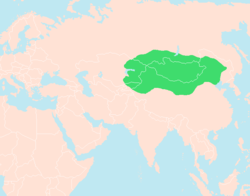Ichise Chanyu
| Ichise | |
|---|---|
| Chanyu | |
 Domain and influence of the Eastern Huns | |
| Reign | c. 126–114 BCE |
| Predecessor | Gunchen Chanyu |
| Successor | Uwei Chanyu |
| Dynasty | Maodun |
| Father | Laoshang Chanyu |
Ichise Chanyu (aka Yizhixie Chinese: 伊稚邪; r. 126–114 BCE), whose full title is unknown, was a Chanyu of the Xiongnu, the successor to Gunchen Chanyu (單于, 軍臣). Ichise Chanyu reigned during the reign of the Han emperor Wudi Liu Che 武帝 劉徹 (r. 141–87 BC), after Wudi broke the heqin 和親 peace and kinship treaty with the Huns.
Ichise Chanyu reigned during one of the most aggressive periods in the Chinese history, and one of the many troubled periods in the Hunnic history. To come to the throne, the Eastern Luli-Prince Ichise, a younger brother of Shanuy Gunchen, had to stage a coup against the next in line to the throne, the Eastern Jükü-Prince (Wise Prince, 屠耆) Yui bi. Yui bi faced Ichise in a battle, was defeated, and fled and submitted to China, where the Chinese Court of Emperor Wu-Di gave him a princely title She-an-heu; in few months after that Yui bi died. A few years before Ichise Chanyu's enthronement, in 133 BC, the Chinese captured Ordos, which the Huns held for the previous 80 years from the time of the Shanuy Touman, after a decade-long occupation by the Zhao state. The loss was a heavy blow for the Huns, and the war flared up. Just as Ichise Shanuy ascended the throne, in the summer the Huns with several tens of thousands cavalry raided Dai-gun (Dai province), killed regional governor Gun Ji, and captured up to 1,000 people; in the autumn the Huns also raided Yai-myn, and also captured up to 1,000 people.
The next year, 125 BCE, the Huns in 3 groups, each with 30,000 cavalry, again raided Chinese provinces. The Western Jükü-Prince, incensed that Chinese Court took away Ordos and built Shuofang (朔方城), a few times attacked the borders of China; and when entered the Ordos, plundered Shuofang, and killed and captured a multitude of officials and people.
In the spring of 124 BCE the Chinese Court appointed Wei Qing (卫青) a Supreme Commander, and assigned him a 100,000 cavalry. Wei Qing set out against the Huns from the Shuofang. The Chinese army at night surrounded the intoxicated Western Jükü-Prince. The Western Jükü-Prince fled. The Chinese took prisoner up to 15,000 of both sexes and up to ten lower Princes from Jükü-Prince wing. In the autumn the Huns retaliated with 10,000 cavalry, killed District Chief Chu Yan, and captured up to 1,000 people.
In 123 BC Wei Qing campaigned twice from the district Dingxiang, penetrating into the Hun lands to the north a few hundred li. During these campaigns, more than 19 thousand Hun people were killed and captured, but the Han troops suffered heavy losses. Two mounted detachments were lost. A commander of one of them, Su Jian (蘇建) managed to escape, but the commander of the second detachment Zhao Xin (趙信) surrendered when he was surrounded. Zhao Xin was a minor Hun prince, who switched to the Han. Once again among his tribesmen, he married the sister of the Shanyu Ichjise and became his chief adviser on matters related to China. On the advice of Zhao Xin, Shanyu moved his headquarters to the north of the Gobi Desert, to avoid direct Chinese assaults, and to lure Chinese troops deep into the steppes to destroy them. The struggle for the Ordos thus concluded with a complete victory for China.[1]
After securing Ordos, the Han dynasty shifted to the west against the Hun nomadic tribes in the territory of the modern Gansu province. In the spring of 121 BCE Chinese cavalry division of 10 thousand horsemen headed by a commander Huo Qubing (霍去病) invaded the Hun lands of the Prince Syuchu. After several battles, Huo Qubing captured many prisoners and a golden idol used for sacrifices to the Sky. In another raid the same year, Huo Qubing inflicted Huns a crushing blow, taking prisoner more than 2,5 thousand Huns and killing over 30 thousand Hun soldiers, but he completely lost a half of his army headed by Li Kuang, only few surviving soldiers were saved from death.
Shanyu Ichise was angered by two serious defeats inflicted by Huo Qubing, and ordered two commanders to report to the court. Both Princes were scared of panishment, Prince Hunie wanted them to flee to China, but Prince Syuchu refused, and Hunie killed him. The treason of Hunie considerably improved the balance of power, strengthening Chinese hand. In the Chinese raids between 124 and 119 BC, the Huns lost, per Chinese annals, 300,000 killed or captured military and civilian people.[2]
Footnotes
References
- Bichurin N.Ya., "Collection of information on peoples in Central Asia in ancient times", vol. 1, Sankt Petersburg, 1851, reprint Moscow-Leningrad, 1950
| Preceded by Gunchen Chanyu |
Ichise Chanyu of the Xiongnu Empire 126–114 BCE |
Succeeded by Uwei Chanyu |